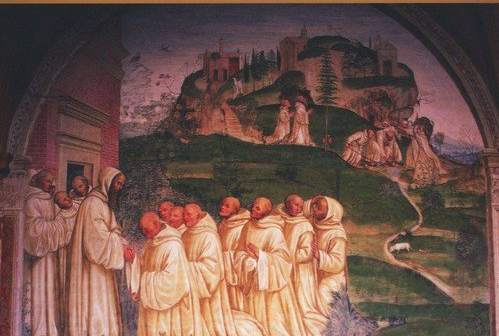Turning Points is a one-volume history of Christianity written for laypeople and students. It tells the Church’s story by describing “decisive moments in the history of Christianity” when the doctrine, character, and institutions of Christianity took a new direction. (The quotation is the book’s subtitle.)
Those moments include:
- The Fall of Jerusalem (70)
- The Council of Nicaea (325)
- The Council of Chalcedon (451)
- The Rule of Benedict (530)
- The Coronation of Charlemagne (800)
- The Great Schism (1054)
- The Diet of Worms (1521)
- The English Acts of Supremacy (1534)
- The Founding of the Jesuits (1540)
- The Conversion of the Wesley Brothers (1738)
- The French Revolution (1789)
- The Edinburgh Missionary Conference (1910)
- The Second Vatican Council (1962–65) and the Lausanne Congress on World Evangelization (1974)
Further, in the Afterword, they identify five twentieth-century trends that may be considered turning points in the future: “the rise and spread of Pentecostalism; the emergence of women into greater public visibility; the massive production of new Bible translations as an aspect, more generally, or the globalization of Christianity; the survival of Christianity under Communist regimes; and the recent flourishing of Christianity in Communist China.”
The authors admit a degree of subjectivity in their selection of these events. They are evangelical Christians in the Reformed (i.e., Calvinistic) tradition. While recognizing that other historians may have chosen different inflection points, the authors humbly make a reasonable case for their selection.
Mark A. Noll—whom I studied with at Wheaton College—first published Turning Points in 1997. This 25th anniversary edition adds husband-wife scholars David and Han-Luen Kantzer Komline. Together, the authors have lightly revised the text; expanded references to women; revised the material in text boxes; and updated statistics, quotations, and suggestions for further reading.
Potential readers may wonder why reading an introductory volume on church history is worthwhile. The authors provide four reasons that I found persuasive:
- The study of the history of Christianity provides an ongoing reminder that the God of the church is not removed from life but works out his will in the history of the world.
- The study of church history provides perspective on the interpretation of Scripture.
- The study of the church gives us fascinating glimpses into the ways Christians have interacted with their culture.
- The study of the church reveals again and again how God has mercifully protected and increased his church despite the sometimes horrendous abuses of those who call themselves Christians.
Turning Points includes study questions at the end of the book for use by groups, such as introductory church history classes, book clubs, Sunday school classes, and small groups.
I enthusiastically recommend this book to anyone interested in the history of the church but unsure where to start.
Book Reviewed
Mark A. Noll, David Komline, and Han-Luen Kantzer Komline, Turning Points: Decisive Moments in the History of Christianity, 4th ed. (Grand Rapids, MI: Baker Academic, 2022).
P.S. If you like my recommendation, please click “Helpful” on my Amazon review page.

